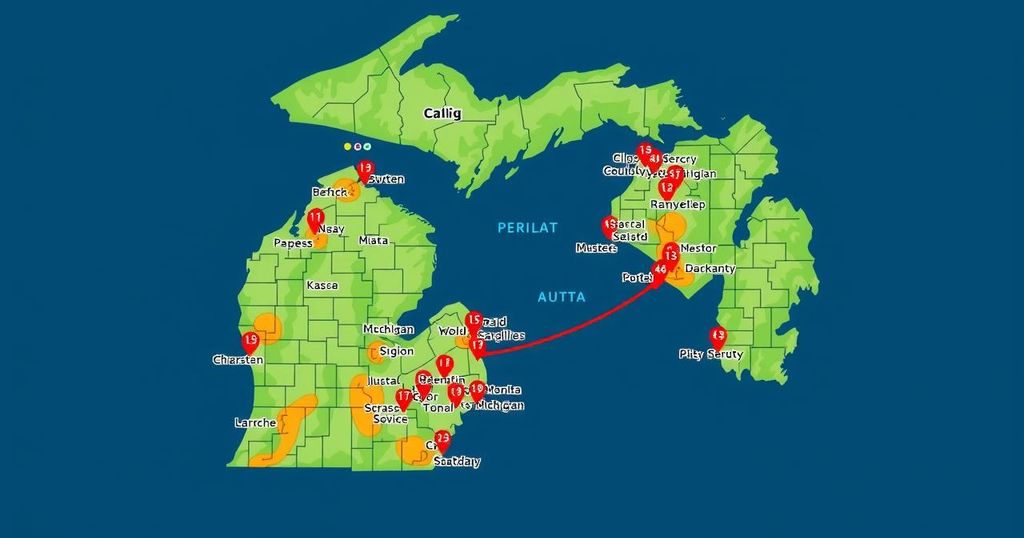Michigan: A Crucial Swing State in the 2024 Presidential Election

Michigan is a vital swing state for the 2024 United States presidential election, with a population of approximately 10.03 million and 15 electoral college votes. While the state shifted to Biden in 2020 after Trump’s victory in 2016, both candidates are actively courting voters by addressing economic and immigration issues, primarily affecting the automotive industry. Diverse voter concerns about living costs will play a significant role in the election outcome, as both parties intensify focus on swing districts and demographics.
Michigan, renowned for its Great Lakes, automotive legacy, and cultural icons, has emerged as a critical swing state in the upcoming 2024 United States presidential election. It stands as one of seven pivotal states that could determine the election outcome. Electoral dynamics in Michigan are particularly volatile; voters here can sway towards either the Democratic or Republican Party, which underscores the significant attention this state garners from presidential candidates as the election nears. With a population of approximately 10.03 million, Michigan parallels the demographic scale of Greece. It possesses 15 electoral college votes out of the total 538, making it a substantial contributor to the electoral process. In recent electoral history, Michigan was instrumental in Donald Trump’s ascendance to the presidency in 2016. However, Joe Biden reclaimed the state for the Democrats in 2020 by a narrow margin of 150,000 votes. Heading into 2024, neither Vice President Kamala Harris nor President Biden is underestimating the importance of Michigan. Campaign strategies are centering on themes pertinent to Michigan’s sizable automotive industry and pressing national issues, including the economy and immigration, which resonate with the electorate. The voter demographic in Michigan is notably diverse, ranging from the urban populace of Detroit—a key Democratic stronghold—to numerous rural communities that lean Republican. As with voters across the nation, many Michiganders express concern over the escalating cost of living. Among them, Darrell Sumpter, a 52-year-old resident who previously supported Trump, has indicated a shift in his voting inclination to Harris this election cycle, stating, “I have never been able to even afford a house. I have been waiting for years.” The automotive sector, centered in Detroit, remains a premier issue for voters in adjacent areas, accentuating the relevance of economic stability. Additionally, the ongoing conflict in the Middle East affects Michigan residents profoundly, particularly given the state’s substantial Arab-American community, the largest in the United States. Experts in political science observe that the Democratic Party is concentrating efforts on solidifying support within Michigan’s prominent left-leaning counties, namely Oakland, Washtenaw, and Wayne. Conversely, the Trump campaign aims to enhance its presence in swing districts like Macomb County, appealing to rural constituents. There is a concerted attempt from Democrats to regain voters who previously aligned with Trump in 2016. Dr. Matt Grossmann, a political science professor at Michigan State University, notes that, “White, non-college voters, manual workers, lots of people who are traditionally affiliated with unions… have been moving towards Republicans.” Additionally, University of Michigan political scientist Jonathan Hanson identifies that both parties are paying considerable attention to Michigan’s swing voters, stating that this group, typically composed of “lower middle-class or working-class voters who just do not really pay attention to politics on a daily basis,” is growing increasingly despondent due to inflation.
The dynamics of Michigan as a swing state hold significant weight in the context of United States presidential elections. Defined by its diverse voter base and economic challenges, Michigan plays a crucial role in shaping electoral outcomes. Historically, the state has oscillated between Democratic and Republican candidates, reflecting broader national sentiments and localized issues that resonate with the electorate. The major demographic distinctions, coupled with economic factors, particularly the automotive industry, further complicate and enrich Michigan’s electoral landscape. Understanding these nuances is essential for comprehending the intricacies of the 2024 election campaign.
In summary, Michigan remains a critical swing state for the 2024 presidential election, with a challenging and dynamic voter landscape. Both major parties are strategically focusing on key demographic areas and addressing significant economic issues, notably within the automotive sector. As candidates tailor their messages to meet the needs and concerns of Michigan voters, the outcome of this state could be pivotal once again, continuing its legacy as a deciding factor in presidential elections.
Original Source: www.bbc.com






